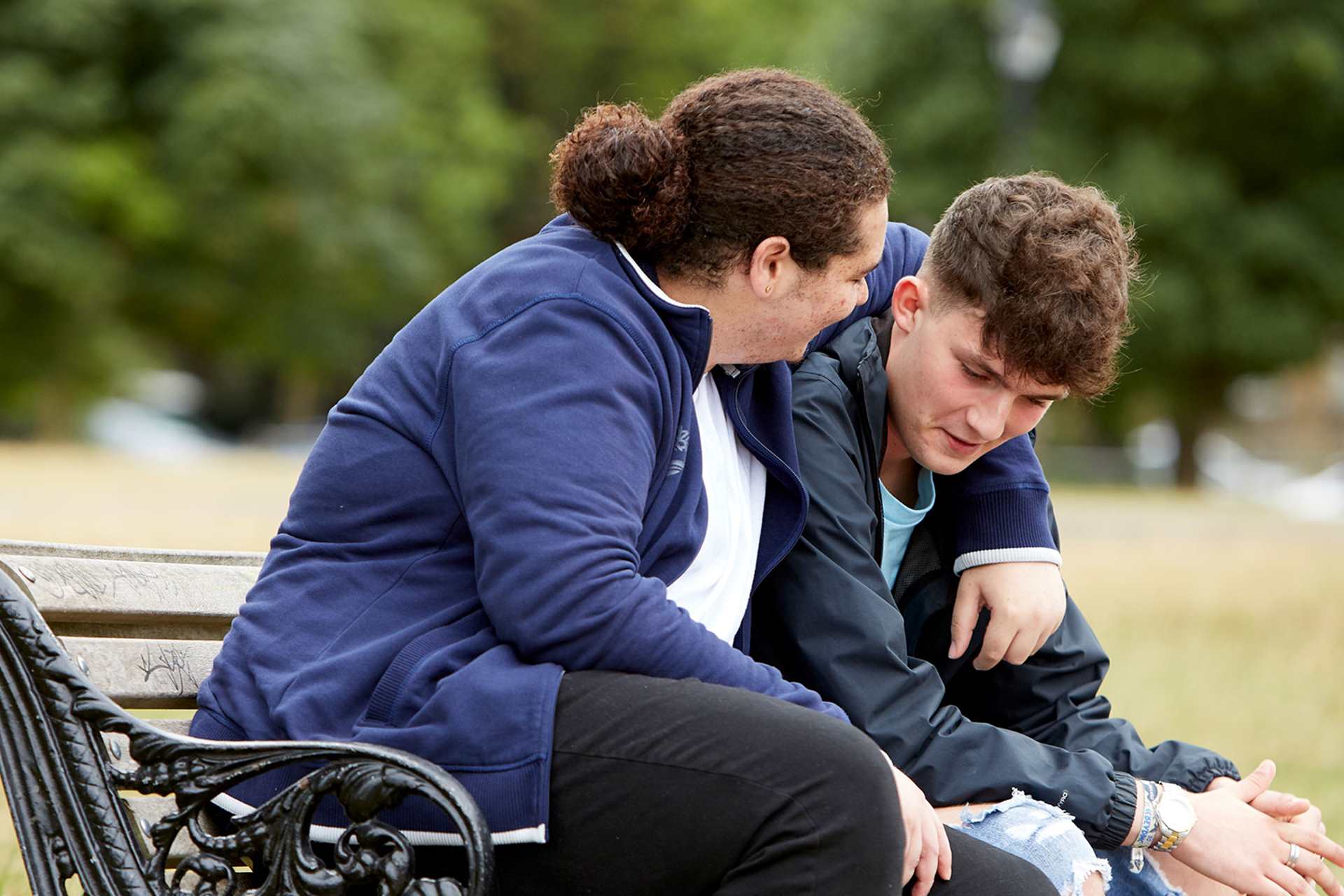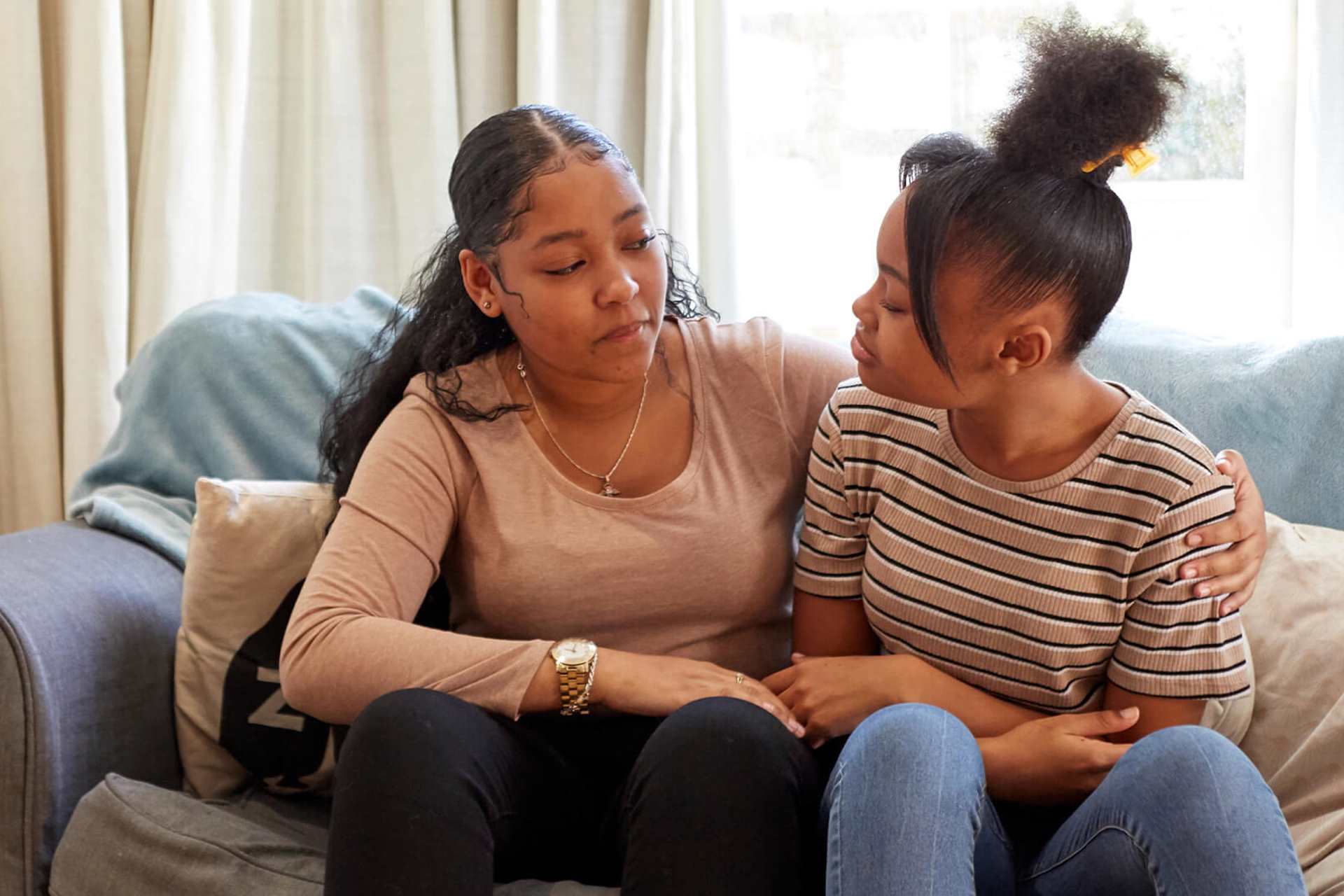If you need urgent help
If you’re feeling suicidal right now, there are people out there who can help you get through this. You can use the helplines listed below for support.
If you need immediate help call 999 and ask for an ambulance – they can get to you quickly and keep you safe.
-
Papyrus
Offers confidential advice and support for young people struggling with suicidal thoughts, as well as family and friends; and information about how to make a safety plan.
Its helpline service - HOPELINE247 - is available to anybody under the age of 35 experiencing suicidal thoughts, or anybody concerned that a young person could be thinking of suicide.
- Opening times:
- 24/7 every day of the year
-
Samaritans
Whatever you're going through, you can contact the Samaritans for support. N.B. This is a listening service and does not offer advice or intervention.
- Opening times:
- 24/7
-
Childline
If you’re under 19 you can confidentially call, chat online or email about any problem big or small.
Sign up for a free Childline locker (real name or email address not needed) to use their free 1-2-1 counsellor chat and email support service.
Can provide a BSL interpreter if you are deaf or hearing-impaired.
Hosts online message boards where you can share your experiences, have fun and get support from other young people in similar situations.
- Opening times:
- 24/7
What are suicidal feelings?
Suicidal feelings or thoughts are when someone thinks about ending their life or doesn’t want to be alive anymore. You might also hear this be called suicidal ideation.
It’s normal to feel low or like things are a bit much sometimes. But if those feelings start taking over and you don’t know what to do, you might think the only way out is to end your life. It’s okay to share that worry and there are lots of people who understand and can help.
If you’re having suicidal thoughts, there is always a reason to live, even when things feel too much. You deserve support. And we’re here to help you figure it out.
Lots of people feel suicidal at some time in their life and one in four young people experience suicidal thoughts at some point, so you’re not alone. There are lots of ways of dealing with these feelings and overcoming them that can help you feel safe again.
There is support out there, and with the right support, you can work through these feelings - as I have experienced myself a couple of times.
What causes suicidal feelings?
Anyone can feel suicidal for any reason. What causes one person to have suicidal feelings might not be the same for someone else. Suicidal thoughts can build up slowly, or they can come out of nowhere. There’s not always a clear reason and it can happen even when life feels okay.
Suicidal thoughts can be linked to feeling depressed or managing mental illnesses. It can appear when you’re stressed, feeling pressure or have gone through trauma. We know that young people who take their own lives are more likely to have self-harmed in the past, but self-harm is not necessarily a sign of feeling suicidal.
Suicidal feelings can get in the way of everything else – it might feel impossible to believe that you can feel better. But you can, no matter how rough things feel right now. Whatever’s making you feel this way, it’s valid and you deserve help.
Suicidal feelings and medications
Suicidal feelings can be a rare side effect of some mental health medications. If you start to feel suicidal after starting medication, tell your GP, psychiatrist or pharmacist straight away. To find out more about medication side effects, see our medication guides.
Warning signs of suicidal feelings
Sometimes it’s hard to spot when you’re dealing with suicidal feelings, especially if they’ve been building up for ages.
Here are some signs of suicidal feelings to watch out for:
- always talking or thinking about death
- deep depression and sadness
- losing interest in daily life
- struggling to sleep or eat
- feeling helpless or worthless
- self-harming
- feeling angry and that things can't change
If any of these sound familiar, don’t keep it to yourself. You deserve help, and you’ll find that life is worth living.
Just know that sometimes we want a bad period of life to end rather than life itself.
What to do about feeling suicidal
Have you hurt yourself, or do you think you might be about to hurt yourself? Call 999 or go to A&E now. You’re not wasting anybody’s time – this is an emergency.
Tips for the long term
Once you feel safer, it’s important to look at what’s bringing up the suicidal feelings and thinking about how you change that for the better.
If something like bullying or problems at school are making you feel like suicide is your only way out, ask someone you trust for help. Sorting out issues like this could dial down thoughts of suicide.
Have a look at our feelings pages for advice on different experiences you might be having, and where to get support.
This can cover what helps you when things feel too much and who can help you. Read more about creating your own. If it feels hard to create, work with a friend, family member or your GP.
Remember: you matter
Here's a reminder that you are loved.
Video description: Charis is a Black young person wearing a black t-shirt and glasses. They are in a room with plants and books and are sharing a message in British Sign Language. The message is 'Oh hi, here’s a reminder in case you don’t believe this. You matter, you are important, you’re loved and you living on this earth right now makes a difference whether you see it or not. Every morning, remind yourself of this ok.'
30 second watch
What will happen if I tell a doctor or teacher that I feel suicidal?
What treatment is there?
When you’re looking for treatment for suicidal feelings, your doctor might suggest:
- cognitive behavioural therapy (CBT)
- other types of therapy, like creative therapy
- medication
The key is finding what feels right for you, and your doctor, therapist or counsellor are there to help.
Confidentiality
Anything you tell a doctor, counsellor or therapist is confidential. They won’t tell anyone else unless you say they can. This includes telling them you’re having suicidal thoughts.
If they think you or someone else is unsafe and at risk of suicide, they can decide to tell someone. But they’ll usually try and let you know first. It’s very unlikely they’d tell your family, but they might encourage you to talk to them.
If you speak to a doctor about suicidal feelings, they may refer you to hospital, or to a mental health service. This doesn’t mean you’ll have to stay in hospital. It’s just so that you can get the right help.
Supporting a friend who is feeling suicidal
If your friend has attempted suicide, call 999 and stay with them until the ambulance arrives. It’s a difficult and scary situation but you’re doing the right thing by getting them help. If you’re worried that a friend is going to try and end their life, get rid of anything they could use to harm themselves, stay by their side, and get emergency help. It’s not all on you, if the situation feels too much make sure you speak to someone, once your friend is safe.
Spotting signs that someone’s dealing with suicidal feelings isn’t always straightforward, but here are some things to watch out for:
- they start acting differently, like being quieter than usual or losing interest in things they normally enjoy
- they talk about death a lot or feeling like it’s all too much, or saying things like, “I’ve had enough” or “everyone’s better off without me”
- they’re being reckless with their health, using drugs or drinking alcohol more, or suddenly doing more dangerous things
- they quickly go from being really stressed out to really calm
If you’re noticing these signs in someone else, it’s okay to ask them what’s going on. It might feel awkward, but bringing it up won’t make things worse.
Talking and offering support is the first step to helping your friend. It might even lift some of the weight off their shoulders. Don’t stress about putting the idea of suicide idea into their head – discussing it openly can make them feel less alone.
Here’s how you can support a friend who’s feeling suicidal:
- Listen without judgement, stay calm and don’t panic.
- It’s okay to use words like ‘suicide’ or ‘ending your life’ and ask direct questions that need yes or no answers. That way there’s no confusion.
- Remember, you’re not there to fix things – just being there matters, even if you’re lost for words (which is okay!).
- Take their feelings seriously and don’t dismiss them.
- Encourage them to talk to a trusted adult. If they don’t feel like they can go to their family, help them think of someone else, like a teacher or family friend.
- Help them build up a wider support network so they know they can speak to Samaritans, or Childline, any time things get tough.
- Don’t forget about your own mental health – supporting a friend who’s been thinking about suicide is a lot. It’s okay to share the load and talk with someone you trust.
Your friend might tell you they’re struggling with suicidal feelings, but not want you to tell anybody. If you feel like it’s getting too much, it’s not on you to fix their problems. It’s okay to ask for help. Your friend might be angry at first if you tell an adult, but they’ll come around. They’ll soon see that it’s because you care.
Some people keep their emotions locked up, especially if it’s about suicidal thoughts. You might feel powerless and unsure what to do. But sometimes just being there is enough. Sitting with them and saying that you’re there for them can mean a lot. Your friend might feel more comfortable talking to someone else, like their family, a teacher, or calling a helpline. The important thing is that they talk to someone.
If you are worried that a loved one may be struggling with suicidal feelings, it’s okay to ask directly. It may feel uncomfortable, but asking about it won’t cause it to happen.
Get help now
If you're feeling suicidal right now, you are not alone and there is help out there. Below are some places you can get support.
-
Papyrus
Offers confidential advice and support for young people struggling with suicidal thoughts, as well as family and friends; and information about how to make a safety plan.
Its helpline service - HOPELINE247 - is available to anybody under the age of 35 experiencing suicidal thoughts, or anybody concerned that a young person could be thinking of suicide.
- Opening times:
- 24/7 every day of the year
-
National Suicide Prevention Helpline UK
Offers a supportive listening service to anyone with thoughts of suicide.
- Opening times:
- 6pm-midnight, daily
-
Samaritans
Whatever you're going through, you can contact the Samaritans for support. N.B. This is a listening service and does not offer advice or intervention.
- Opening times:
- 24/7
-
Childline
If you’re under 19 you can confidentially call, chat online or email about any problem big or small.
Sign up for a free Childline locker (real name or email address not needed) to use their free 1-2-1 counsellor chat and email support service.
Can provide a BSL interpreter if you are deaf or hearing-impaired.
Hosts online message boards where you can share your experiences, have fun and get support from other young people in similar situations.
- Opening times:
- 24/7
-
CALM (Campaign Against Living Miserably)
Provides support to anyone aged 16+ who is feeling down and needs to talk or find information.
Free webchat service available.
Read information about the helpline and how it works.
- Opening times:
- 5pm - midnight, 365 days a year
Whether you love the page or think something is missing, we appreciate your feedback. It all helps us to support more young people with their mental health.
Please be aware that this form isn’t a mental health support service. If you are in crisis right now and want to talk to someone urgently, find out who to contact on our urgent help page.
At YoungMinds we take your privacy seriously. If you’d like to read more about how we keep the information we collect safe, take a look at our privacy policy.






